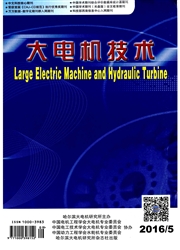

 中文摘要:
中文摘要:
由于抽水蓄能机组水泵水轮机调节系统结构复杂,工况类型多且转换频繁,容易受水泵水轮机全特性曲线反“S”特性的影响,因此其运行稳定问题比一般机组更加严峻,严重时甚至会影响到电网的供电质量和安全稳定。本文针对传统PID控制在抽水蓄能机组应用中的不足,提出了抽水蓄能机组的分数阶PID(FOPID)控制及其参数优化方法。为提高FOPID控制参数优化效果,提出了一种模糊引力搜索算法(FGSA),该算法在迭代搜索过程中,对引力衰减指数进行动态的模糊推理,使之随搜索代数的改变不断自适应调整,从而通过控制引力常数的大小实现对算法局部和全局搜索进行动态调整,提高算法优化能力。以我国某抽水蓄能电站机组为研究对象建立其调节系统仿真模型,运用不同优化方法和控制规律的组合控制策略进行控制,对比试验结果表明,本文提出的FGSA-FOPID控制策略能有效改善抽水蓄能机组水泵水轮机调节系统在空载工况下频率扰动时的动态性能。
 英文摘要:
英文摘要:
Because of the complex structure, complicated operation modes and frequently switching of operating conditions, the pumped storage unit (PSU) is easily tends to fall into the "S" feature area. Compared to conventional hydroelectric generating unit, it faces more stability problems and risk of deteriorating the power supply quality and stability of the entire grid. Respect to the disadvantages of PID control on PSU, this paper proposed fractional PID (FOPID) control and corresponding parameter optimization method. In order to improve the effectiveness of parameter optimization of FOPID control, a fuzzy gravitational search algorithm (FGSA) is proposed. In the searching process, the FGSA tunes the gravitational attenuation index adaptively by fuzzy inference. By controlling the value of the gravitational constant, the exploration and exploitation of the algorithm can be adjusted dynamically as to improve the ability of the algorithm to optimize parameters. An actual pumped storage power station unit is taken into consideration in our country. Based on comparisons of the control strategies combined of different optimization methods and PID control rules, it's found that the proposed FGSA-FOPID control strategy can effectively improve the dynamic performance of pumped storage unit regulating system under unload condition with speed disturbance.
 同期刊论文项目
同期刊论文项目
 同项目期刊论文
同项目期刊论文
 期刊信息
期刊信息
